News
Duke Energy Violates the Law by Hiding Critical Dam Safety Information
Posted on September 20th, 2017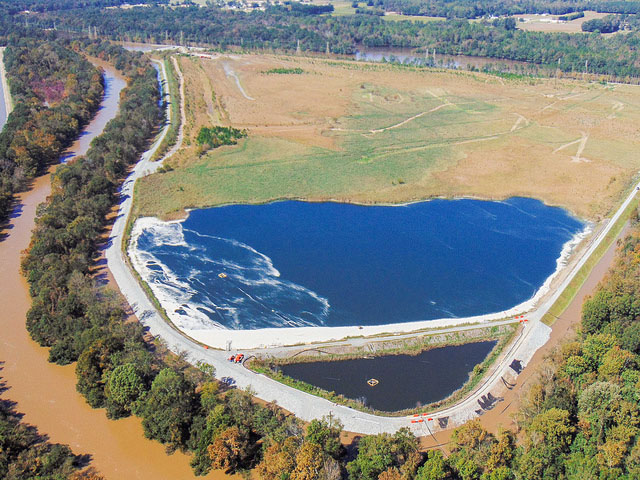
HF Lee Coal Ash Pond Post-Hurricane Matthew
Press Release from the Southern Environmental Law Center
For Immediate Release: September 20, 2017
Contact:
Matthew Starr, 919-961-2240 or upperneuserk@soundrivers.org
Kathleen Sullivan, 919-945-7106 or ksullivan@selcnc.org
Duke Energy Violates the Law by Hiding Critical Dam Safety Information
Information Withheld for Coal Ash Sites across North Carolina
CHAPEL HILL, N.C.— Local community groups across the country today sent Duke Energy and government authorities notices that they plan to bring enforcement actions against Duke Energy for withholding critical dam safety information that Duke Energy was required to disclose to communities in April of this year. The Southern Environmental Law Center sent notices on behalf of community organizations regarding 10 Duke Energy sites across North Carolina where primitive, aging earthen dams hold back coal ash next to rivers and lakes. Behind dams rated High and Significant Potential Hazards, these unlined, leaking Duke Energy sites hold a total of over 92 million tons of coal ash upstream of public drinking water intakes and many are located near people’s homes and communities.
The Southern Environmental Law Center sent notices on behalf of these community groups in North Carolina: Appalachian Voices, Catawba Riverkeeper Foundation, MountainTrue, Roanoke River Basin Association, Sound Rivers, Southern Alliance for Clean Energy, Waterkeeper Alliance, and Winyah Rivers Foundation. Earthjustice sent similar notices on behalf of community organizations in Kentucky and Indiana.
Under the Coal Combustion Residuals Rule enacted in 2015 following coal ash disasters, including at Duke Energy’s Dan River site in North Carolina, Duke Energy was required to make public Emergency Action Plans for each of its coal ash storage sites where a failure would likely result in loss of human life or serious harm to the environment by April 2017. Those plans are required to include inundation maps to show the surrounding areas that would be damaged by a failure of Duke Energy’s dangerous coal ash storage sites and also the names and contact information for emergency responders. This information is designed to let communities know the risks they face and also how to respond when a coal ash disaster occurs.
Duke Energy is the only utility in the country that is withholding this information from the public. In all of Duke Energy’s Emergency Action Plans, including in states that face flooding and hurricanes, Duke Energy has blacked out the coal ash spill maps and information for how to contact emergency responders in the event of a disaster. An example of Duke Energy’s blacked-out emergency plans can be seen at this link: https://southernenvironment.sharefile.com/d-sf596f36bc3f4e1a8
Today’s notices challenge Duke Energy’s effort to withhold information regarding the following Duke Energy coal ash storage sites in North Carolina: Allen on Lake Wylie near Belmont and Charlotte, Asheville on the French Broad River near Asheville, Belews Creek on the Dan River in Stokes County near Eden and Madison, Cliffside (Rogers Energy) on the Broad River near Shelby, Dan River on the Dan River near Danville, Lee on the Neuse River near Goldsboro, Marshall on Lake Norman near Davidson and Charlotte, Mayo on Mayo Lake and the Dan River near Roxboro, Roxboro on Hyco Lake and the Dan River near Roxboro, and Weatherspoon on the Lumber River in Robeson County near Lumberton. These notices are available here: https://southernenvironment.sharefile.com/d-sa4092ae06794d3bb
“Of all the utilities in the country, only Duke Energy is withholding this information–what does Duke Energy have to hide?” said Frank Holleman, senior attorney for the Southern Environmental Law Center which represents the North Carolina groups. “Duke Energy is scared of the public reaction when people learn how much of their communities will be devastated by coal ash and toxic water pollution if Duke Energy’s dangerous coal ash storage sites fail. North Carolina’s communities near Duke Energy’s coal ash sites deserve better than this.”
Duke Energy’s operating companies are on nationwide federal criminal probation because in 2015 they pleaded guilty 18 times to nine Clean Water Act crimes committed at its coal ash sites across North Carolina. Duke Energy was responsible for one of the largest coal ash disasters in U.S. history when its Dan River coal ash site failed in 2014, spilling over 20 million gallons of coal ash polluted water and 39,000 tons of coal ash into the Dan River. Duke Energy is facing continuing litigation at six of its coal ash sites in North Carolina where it continues to refuse to remove its coal ash from leaking and polluting unlined pits on the banks of rivers and lakes in North Carolina. By criminal plea agreement, court order, settlement agreement, and regulatory requirements, Duke Energy is required to remove all its coal ash from 10 of its sites in North and South Carolina.
Additional comments from the community groups in North Carolina follow.
Matthew Starr, the Upper Neuse Riverkeeper at Sound Rivers, client on the Lee notice:
“Even though Duke Energy pleaded guilty to nine Clean Water Act crimes for its mishandling of coal ash at Lee and at other sites across North Carolina and has a major coal ash disaster in its recent past, it’s now refusing to provide basic safety information needed by communities nearby and downstream who face the risk of another coal ash disaster.”
Amy Adams of Appalachian Voices, client on the Belews Creek notice:
“For far too long, Duke Energy has taken advantage of communities near its leaking, unlined coal ash pits and that needs to stop. The people living near or downstream of Belews Lake—site of Duke’s largest coal ash pit in the state—need to know what their risk is in the event of an emergency as we saw happen downstream on the Dan River.”
Sam Perkins, Catawba Riverkeeper at the Catawba Riverkeeper Foundation, client on the Allen and Marshall notices:
“People who depend on drinking water from near or downstream of Duke Energy’s unlined, leaking coal ash pits at Marshall and Allen, including people who live around Lake Norman and in Charlotte and on Lake Wylie in Belmont and York County, South Carolina, need to know what the risks are and emergency information to prepare in case there is another Duke Energy coal ash disaster.”
Hartwell Carson, French Broad Riverkeeper at MountainTrue, client on the Asheville and Cliffside (Rogers Energy) notices:
“Communities and waterways adjacent to and downstream of Duke Energy’s leaking unlined pits have suffered enough. Asheville and the French Broad River have the benefit of full excavation at the Lake Julian site, but it’s past time for Duke Energy to similarly protect the Broad River and downstream communities at the Cliffside/Rogers plant. It’s also inexcusable for Duke Energy hide from North Carolina’s communities the risk they face in the event of another coal ash disaster.”
Scott Van Der Hyde, executive director at the Roanoke River Association, client on the Dan River, Mayo and Roxboro notices:
“People here along the Dan River and Roanoke River watershed remember Duke Energy’s coal ash spill and we don’t want any community to be caught unprepared by the next coal ash disaster.”
Amelia Shenstone of the Southern Alliance for Clean Energy, client on the Dan River notice:
“As we know from Duke’s Dan River coal ash disaster, it’s critical for downstream communities and responders to have this risk and emergency information when a coal ash disaster strikes.”
Pete Harrison of Waterkeeper Alliance, client on the Allen, Asheville, Dan River, Lee, and Marshall notices:
“You’d think that after being convicted on nine counts of federal coal ash crimes and having to pay over a hundred million dollars in fines and restitution, Duke Energy would have learned it doesn’t get to pick and choose which laws it has to obey and which ones it can ignore. Illegally concealing vital safety information from people who live in the shadows of its massive, leaking coal ash dumps is a new low for this habitual offender – especially when you consider every other power company in the country complied with these basic safety requirements.”
Christine Ellis of the Winyah Rivers Foundation, client on the Weatherspoon notice:
“Even though Weatherspoon will be cleaned up, however excavation and removal has not yet started and will be several years in the future so risk and emergency information is absolutely critical for our community and all communities where Duke has yet to clean up their leaking, unlined coal ash pits next to our rivers and lakes.”
###
Note: Duke Energy’s Emergency Action Plans for their coal ash sites can be found through this webpage https://www.duke-energy.com/our-company/environment/compliance-and-reporting/ccr-rule-compliance-data by selecting the site and then the link to the respective Emergency Action Plan.
About the Southern Environmental Law Center
The Southern Environmental Law Center is celebrating its 30th anniversary this year. With nine offices across the region (Charlottesville, VA; Chapel Hill, NC; Atlanta, GA; Charleston, SC; Washington, DC; Birmingham, AL; Nashville, TN; Asheville, NC; and Richmond, VA), SELC is widely recognized as the Southeast’s foremost environmental organization and regional leader. SELC works on a full range of environmental issues to protect the South’s natural resources and the health and well-being of all the people in our region. www.SouthernEnvironment.org
Related News
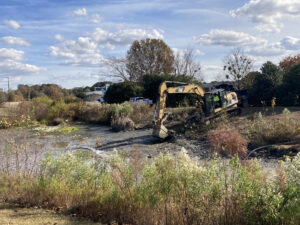
Position available: Stormwater Education Coordinator
April 18th 2024
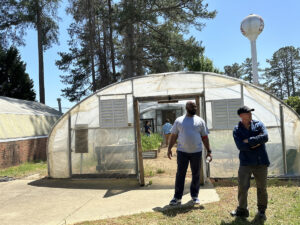
Southern Nash next in line for stormwater projects
April 18th 2024
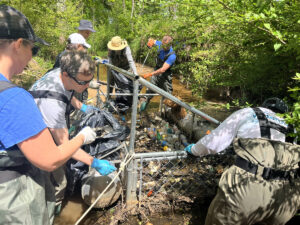
Xylem, Sound Rivers team up for cleanup
April 18th 2024

Sound Rivers launches new podcast
April 18th 2024

Swim Guide gearing up for a seventh season
April 11th 2024
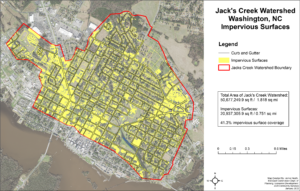
Feedback needed for Jack’s Creek plans, projects
April 11th 2024

Pamlico-Tar Riverkeeper talks water quality
April 11th 2024
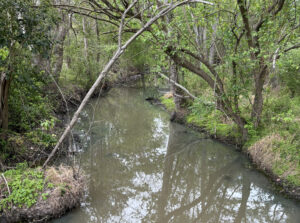
Pamlico-Tar Riverkeeper investigates Maple Branch turbidity
April 11th 2024

